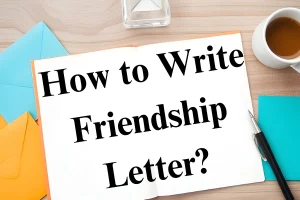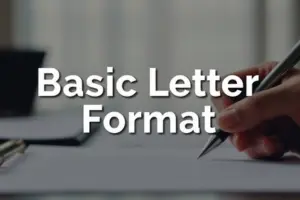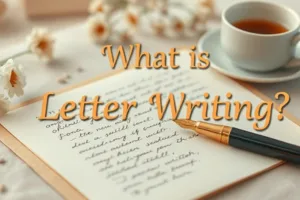What Are Friendship Letters? Understanding Their Meaning and Importance
Published: 21 Nov 2024
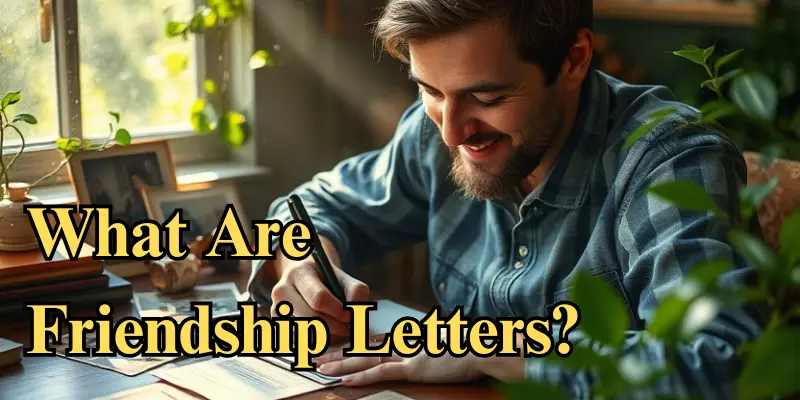
Welcome! A little girl named Sara is sitting by her window on a rainy day, thinking about her best friend, Mia, who has just moved to a different city. They had spent every day together, playing and laughing, but now there’s this quiet distance between them. Sara thinks about how she misses their adventures and the way they used to talk about everything. One day, she remembers something her teacher once told her:
“Friendship is born when two people find joy in each other’s company, but it is strengthened when words are shared, even from far away.” Her Teacher
That simple piece of advice becomes the spark that leads her to write Mia a letter. Little did she know, this friendship letter would be more than just words on paper—it would be the beginning of a deeper connection, even miles apart.
In this article, we will explore what are friendship letters, why they matter in friendship communication, and how they can strengthen your bond with your friends. We’ll also look at the importance of letter writing in friendships and how a few simple words can bring you and your friends closer together.
So, let’s begin—grab your pen and get ready to discover what are friendship letters and how they can impact your relationships!
1. What are Friendship Letters?
A friendship letter is simply a letter written to a friend, where you share your thoughts, feelings, and personal updates. It’s like sending a little piece of your heart through words. You can write one anytime, whether it’s to celebrate something, express your emotions, or just to stay in touch. These letters can be formal or informal, but they’re usually personal and informal, making them feel special.
Purpose of Friendship Letters
People write friendship letters for different reasons, like:
- Showing appreciation: You might write to say thanks for being a great friend.
- Offering support: Sometimes, a friend just needs to hear that you’re there for them.
- Staying in touch: Life can get busy, but a letter can help you stay connected even if you’re far apart.
2. Types of Friendship Letters
Informal Letters
Most friendship letters are informal and written in a casual, conversational tone. This type of letter allows you to freely express your thoughts and feelings with your friend, without worrying about structure. You can share stories, jokes, or even your daily experiences. It’s all about connecting on a personal level and showing your true self.
Formal Letters
While informal letters are the most common, in some situations, you might write a formal friendship letter. This could happen in more professional or business relationships where the tone is polite and structured. However, these types of letters are rare and usually used when a friend is also a colleague or business partner.
Special Occasion Letters
Special occasion letters are written to celebrate milestones, offer congratulations, or simply show appreciation on important dates. Here are 5 examples of special occasion friendship letters:
- Birthday Wishes
A birthday letter is a thoughtful way to wish your friend a happy day, expressing your love and best wishes for the year ahead. - Thank-You Notes
Whether it’s for a gift, favor, or support, a thank-you letter shows appreciation and gratitude. It’s a meaningful way to let your friends know how much they mean to you. - Congratulatory Letters
If your friend has achieved something amazing, like graduating or getting a new job, a congratulations letter can make their celebration even more special. - Holiday Greetings
Writing a holiday letter to wish your friend joy and warmth during the festive season can help strengthen your bond, even if you’re far apart. - Anniversary Letters
If it’s the anniversary of your friendship, a friendship anniversary letter can be a beautiful reminder of how much your friendship has grown over the years.
These special occasion letters help celebrate the big and small moments, keeping your connection strong and personal.
3. Key Characteristics of Friendship Letters
Personal Touch
A friendship letter should always feel personal and unique. It’s a chance to show your friends how much they mean to you. This can include things like:
- Inside jokes that only the two of you understand.
- Shared memories from your time together, like a fun trip or funny incident.
- Updates on life, like what’s been happening in your world since you last spoke.
These personal touches help make the letter feel special and remind your friend of the unique bond you share.
Emotional Tone
The tone of a friendship letter is usually warm and genuine. You want your friend to feel your emotions through your words. Whether you’re expressing excitement, love, or sympathy, the letter should reflect the true feelings you have for your friend. This emotional connection is one of the key reasons why writing a friendship letter is such a meaningful way to stay in touch.
Structure
While friendship letters can vary in length and content, they usually follow a simple structure:
- Greeting: Start with a friendly “Hi” or “Dear [friend’s name]”.
- Body: This is where you share your message, whether it’s a story, an update, or just a few kind words.
- Closing: End with something like “Take care” or “With love,” followed by your signature.
This simple structure keeps things clear and personal while ensuring your message comes across in a heartfelt way.
If you want to learn more about writing a friendship letter in detail, be sure to read the article on how to write a friendship letter.
4. Why Friendship Letters Are Important
Friendship letters hold a lot of value because they help maintain strong connections with friends, even when you’re far apart.
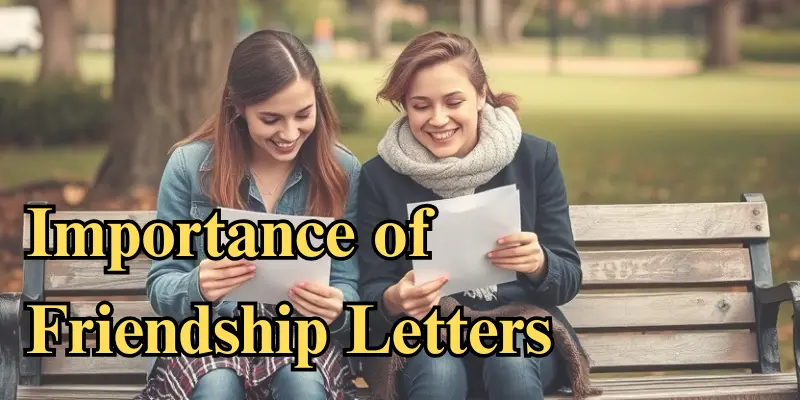
Here’s why they matter:
1. They Strengthen Bonds
Writing a friendship letter lets you express how much your friend means to you. By sharing personal stories, updates, or just checking in, you remind your friend of the special bond you share. It’s a great way to keep your friendship strong over time, especially when you can’t meet in person.
2. They Show You Care
A friendship letter is one of the best ways to show that you care. It’s not just a casual message; it’s a thoughtful gesture that says, “I’m thinking of you.” Whether it’s a birthday note, a thank-you message, or just a letter to say you miss them, it’s a simple way to let your friend know you’re there for them.
3. They Create Lasting Memories
When you look back at old letters from friends, they become memories that last a lifetime. A friendship letter isn’t just words on paper; it’s a piece of your shared history. Every time you read it, it brings back those moments and emotions, making it a treasure to hold onto.
4. They Help You Communicate Better
Sometimes, it’s easier to express your feelings in writing than in person. A friendship letter gives you the chance to think about what you want to say and share your true feelings. It’s a safe space to open up and say things you might find hard to say face-to-face.
5. They Keep You Connected Over Distance
Whether your friend lives far away or you’re both busy with life, a friendship letter helps bridge the gap. Even if you’re not able to talk every day, writing a letter lets your friend know that you’re still thinking about them and that distance doesn’t change how much you care.
5. Common Uses of Friendship Letters
Friendship letters are not just for special occasions; they can be used for many reasons. Below, we’ll explore some of the common ways people use friendship letters to express their feelings and stay connected.
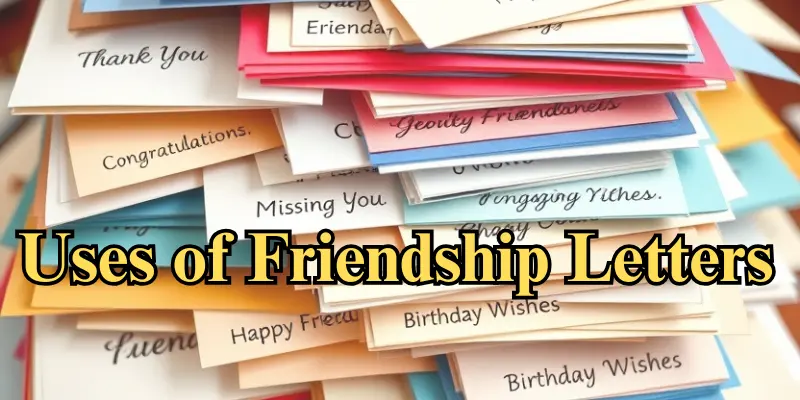
Thank You Notes
One of the most common reasons people write friendship letters is to say “thank you.” Whether it’s for a gift, a kind gesture, or support during difficult times, a thank-you note shows your appreciation.
Celebrations
Friendship letters are often written to celebrate happy moments. You might write a letter to congratulate a friend on their birthday, wedding, or a big career achievement. It’s a personal way to share your joy for them.
Apologies or Reconciliation
Sometimes, misunderstandings happen. If you hurt a friend’s feelings or had an argument, a friendship letter can be a sincere way to apologize and make things right. It shows you care about fixing the relationship.
Just Because
Not every letter needs a special reason. Sometimes, you might write a friendship letter just to check in with your friend or remind them how much they mean to you. It’s a sweet way to stay connected without a specific occasion.
6. Examples of Friendship Letters
Friendship letters come in many forms, depending on the occasion or message you want to share. Below are some short examples of common friendship letters to help you visualize their structure and tone.
1. Birthday Letter
“Dear [Friend’s Name],
Happy Birthday! I hope your day is as amazing as you are. You’ve always been such an important part of my life, and I’m so lucky to have a friend like you. Let’s celebrate soon—I can’t wait to make more memories together!”
This type of letter is cheerful and filled with love, perfect for making a friend feel special on their big day.
2. Thank-You Note
“Hi [Friend’s Name],
I just wanted to thank you for always being there for me. Your support during [specific event] meant the world to me. I’m so grateful for your friendship and everything you do to brighten my life.”
Thank-you notes are a thoughtful way to show gratitude and strengthen your bond.
3. Letter of Support
“Dear [Friend’s Name],
I know you’re going through a tough time, and I want you to know that I’m here for you. If you ever need to talk or just need someone to listen, I’m just a call away. You’re stronger than you think, and I believe in you!”
Support letters are warm and encouraging, showing your friend that they’re not alone.
7. How Friendship Letters Differ from Other Forms of Communication
We all have so many ways to talk to our friends, but a friendship letter is something special. Let’s see how it’s different from other ways we stay in touch:
Social Media vs. Letters
Think about sending a quick text or a DM—it’s nice, but it’s over in seconds. A friendship letter, though? It’s like giving your friend a piece of your time and heart. Writing a letter means you’ve thought about what to say, and that effort makes it way more personal and meaningful. Plus, your friend can keep it forever!
Face-to-Face Conversations vs. Letters
Talking face-to-face is great because it’s instant, but it’s also easy to forget what was said. A friendship letter, on the other hand, stays with you. It lets you take your time to express how you feel, and your friend can reread it anytime they miss you or need a little pick-me-up.
Conclusion
So, what are friendship letters all about? They’re heartfelt tokens of love, care, and connection that leave a lasting impact on relationships. Here’s what we’ve covered:
- Friendship letters are deeply personal and meaningful, filled with emotions and memories.
- They serve various purposes, from expressing gratitude to strengthening long-distance bonds.
- Unlike quick texts or social media posts, they provide a timeless, thoughtful way to communicate.
Why not try writing one today?
- Say, thank you to a dear friend.
- Share your happiness for a milestone they’ve achieved.
- Or simply remind them how much they mean to you.
We’d love to hear your thoughts about this guide. Share your feedback in the comments below. If you have any questions about letters, don’t hesitate to ask—we’re here to help!
Remember, a friendship letter is a simple gesture that can create unforgettable moments. 😊

- Be Respectful
- Stay Relevant
- Stay Positive
- True Feedback
- Encourage Discussion
- Avoid Spamming
- No Fake News
- Don't Copy-Paste
- No Personal Attacks

- Be Respectful
- Stay Relevant
- Stay Positive
- True Feedback
- Encourage Discussion
- Avoid Spamming
- No Fake News
- Don't Copy-Paste
- No Personal Attacks

